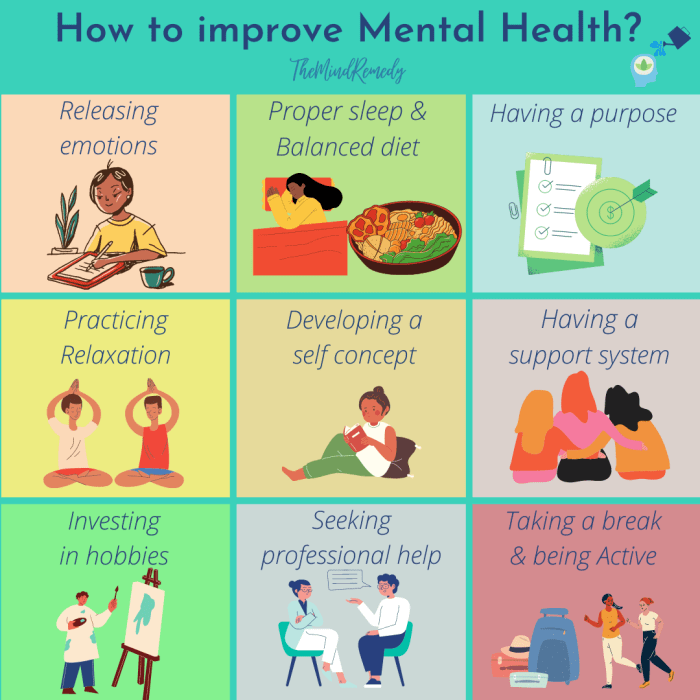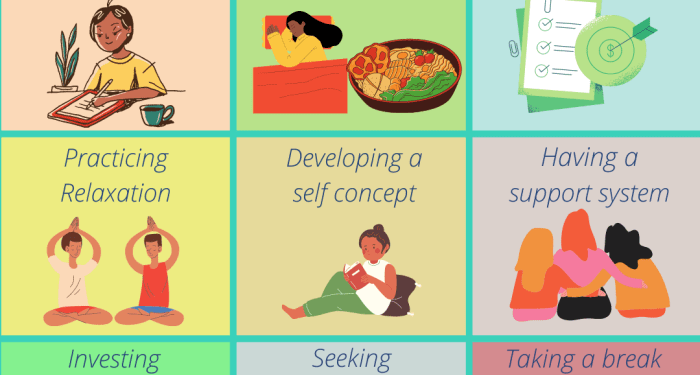Exploring the realm of mental health naturally opens up a world of possibilities for enhancing well-being and vitality. From healthy lifestyle choices to stress management techniques, this guide delves into the multifaceted ways one can improve mental health organically.
Delving deeper into each aspect, we uncover the secrets to fostering a sound mind and a balanced life through simple yet effective methods.
Introduction to Mental Health
Mental health refers to our emotional, psychological, and social well-being. It affects how we think, feel, and act, influencing how we handle stress, relate to others, and make choices in our daily lives.
Ensuring good mental health is crucial for overall well-being as it impacts every aspect of our lives. When we prioritize our mental health, we are better equipped to cope with the challenges life throws at us, maintain healthy relationships, and make sound decisions.
Importance of Mental Health
- Improves Quality of Life: A healthy mental state enhances our overall quality of life, allowing us to enjoy experiences and relationships more fully.
- Boosts Resilience: Good mental health helps us bounce back from setbacks, enabling us to face challenges with greater strength and determination.
- Enhances Productivity: When our mental health is at its best, we are more focused, motivated, and productive in our personal and professional endeavors.
- Reduces Risk of Health Issues: Poor mental health can contribute to physical health problems, making it essential to prioritize mental well-being to prevent such risks.
Benefits of Improving Mental Health Naturally
- Long-lasting Results: Natural methods of improving mental health often lead to sustainable benefits that support long-term well-being.
- Minimal Side Effects: Unlike some medications, natural approaches typically have fewer side effects, promoting a holistic approach to mental wellness.
- Empowerment and Self-awareness: Natural techniques encourage self-reflection and empowerment, allowing individuals to take an active role in their mental health journey.
- Cost-effective: Many natural remedies and practices for mental health improvement are affordable or even free, making them accessible to a wide range of individuals.
Healthy Lifestyle Choices
Adopting healthy lifestyle choices can have a significant positive impact on mental health. These choices can help in reducing stress, improving mood, and enhancing overall well-being.
Regular Exercise
Regular exercise plays a crucial role in improving mental health. Physical activity releases endorphins, also known as "feel-good" hormones, which can help reduce symptoms of anxiety and depression. Exercise also promotes better sleep, boosts self-esteem, and provides a sense of accomplishment.
Balanced Diet
A balanced diet is essential for maintaining mental well-being. Nutrient-rich foods such as fruits, vegetables, whole grains, lean proteins, and healthy fats can provide the necessary vitamins and minerals that support brain function and mood regulation. Avoiding excessive consumption of processed foods, sugary snacks, and caffeine can help in stabilizing mood and energy levels.
Stress Management Techniques
Managing stress is essential for improving mental health naturally. By incorporating various techniques into your daily routine, you can reduce the negative impact of stress on your well-being.
Mindfulness Practices: Meditation and Deep Breathing Exercises
Practicing mindfulness through meditation and deep breathing exercises can help calm the mind and reduce stress levels. Meditation involves focusing on the present moment, which can help alleviate anxiety and promote relaxation. Deep breathing exercises, such as diaphragmatic breathing, can activate the body's relaxation response and reduce cortisol levels, the stress hormone.
- Take a few minutes each day to practice mindfulness meditation, focusing on your breath or a specific mantra to quiet the mind.
- Engage in deep breathing exercises by inhaling deeply through your nose, holding for a few seconds, and exhaling slowly through your mouth.
- Regular practice of these techniques can improve your ability to cope with stress and enhance your overall mental well-being.
Setting Boundaries to Reduce Stress Levels
Setting boundaries is crucial for managing stress effectively. By establishing limits on your time, energy, and interactions, you can prevent burnout and protect your mental health.
- Learn to say no to requests that overwhelm you or compromise your well-being.
- Communicate your needs and limits clearly to others to avoid unnecessary stress and conflict.
- Prioritize self-care activities and make time for relaxation to recharge and rejuvenate your mind and body.
Social Connections and Support
Social connections play a crucial role in maintaining good mental health
Ways to Foster Healthy Relationships
Cultivating healthy relationships involves open communication, mutual respect, and active listening. It is essential to spend quality time with loved ones, show empathy, and offer support when needed.
- Nurture existing relationships by staying in touch regularly.
- Join community groups or clubs to meet new people and expand your social circle.
- Practice gratitude and express appreciation towards your friends and family.
- Set boundaries to ensure a healthy balance in your relationships.
Benefits of Seeking Professional Help or Therapy
Seeking professional help or therapy is a proactive step towards improving mental health. Therapists can provide guidance, tools, and support to help individuals navigate through challenges and develop coping strategies.
Therapy sessions can offer a safe space to explore emotions, gain insights, and work towards personal growth.
- Therapists can help identify unhealthy patterns and provide techniques to manage stress and anxiety.
- Professional help can offer a fresh perspective on issues and empower individuals to make positive changes in their lives.
- Therapy can help improve communication skills, enhance self-awareness, and promote emotional well-being.
- It is important to seek help when feeling overwhelmed, experiencing persistent negative thoughts, or facing difficulties in daily functioning.
Quality Sleep and Mental Health

Quality sleep plays a crucial role in maintaining good mental health. Lack of proper sleep can lead to various mental health issues such as anxiety, depression, and mood swings. It is essential to understand the relationship between quality sleep and mental well-being in order to prioritize and improve both aspects of health.
Tips for Improving Sleep Hygiene
- Avoid caffeine, nicotine, and heavy meals close to bedtime.
- Create a comfortable and relaxing sleep environment by keeping your bedroom dark, quiet, and cool.
- Establish a bedtime routine to signal your body that it's time to sleep, such as reading a book or taking a warm bath.
- Avoid screens (phones, computers, TVs) at least an hour before bed, as the blue light can disrupt your sleep cycle.
- Exercise regularly but avoid vigorous exercise close to bedtime.
Importance of Establishing a Consistent Sleep Routine
Having a consistent sleep routine helps regulate your body's internal clock, leading to better quality sleep and improved mental well-being. When you go to bed and wake up at the same time every day, your body gets used to the schedule, making it easier to fall asleep and wake up feeling refreshed.
Consistency in your sleep routine can also help reduce stress and anxiety levels, contributing to overall mental health.
Summary

In conclusion, prioritizing mental health through natural means is not just a choice but a lifestyle. By incorporating these strategies into your daily routine, you pave the way for a happier, healthier you.
Questions Often Asked
How often should I exercise to improve my mental health?
It's recommended to engage in at least 30 minutes of moderate exercise most days of the week to reap the mental health benefits.
What are some quick stress management techniques I can use on-the-go?
Deep breathing exercises, short mindfulness sessions, and taking short breaks to relax can help alleviate stress in the moment.
Is it normal to seek professional help for mental health concerns?
Yes, seeking professional help like therapy is a proactive step towards improving mental health and should be normalized.















